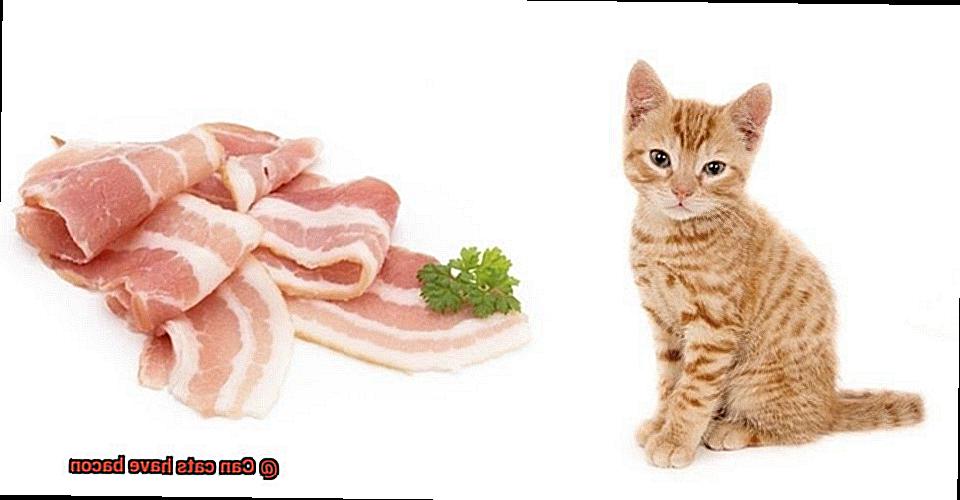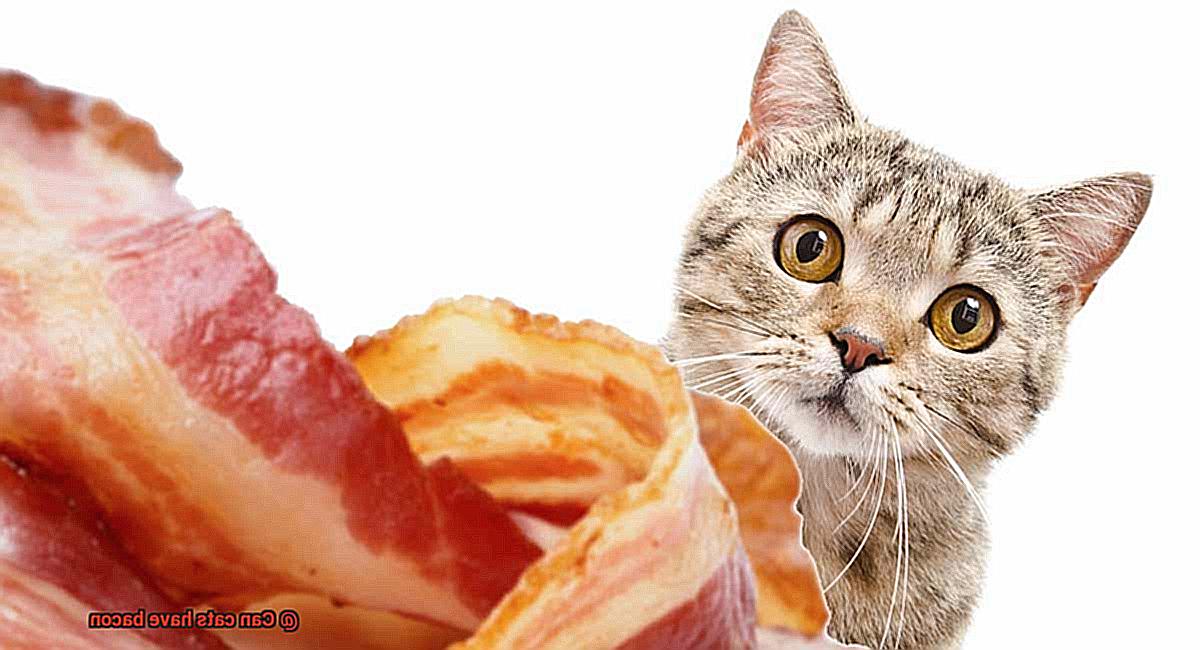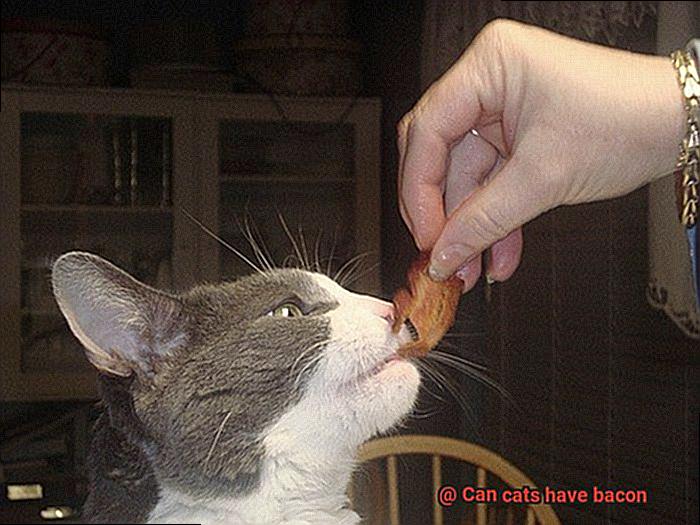As pet owners, we all love to spoil our furry friends with treats. But when it comes to cats, their dietary needs are a bit more specific than dogs. If you’re a bacon enthusiast, you might be wondering if your feline friend can also enjoy this delicious treat. So, can cats have bacon? Well, the answer isn’t as simple as a yes or no.
In this blog post, we’ll dive into the world of cat nutrition and explore whether bacon is a safe snack for your beloved kitty. We’ll examine the nutritional value of bacon and how it affects cats’ health. Plus, we’ll discuss the potential risks of feeding bacon to your feline companion. Don’t worry; we won’t leave you hanging without some alternatives that are both safe and healthy for your cat to enjoy.
If you’re like us and want to know what foods are safe to feed your kitty, then keep reading. We’ve got all the juicy details on whether bacon is a safe and healthy treat for your furry friend.

Is Bacon Toxic for Cats?
Not all human foods are safe for cats to consume, and bacon is one of them. This beloved breakfast staple can actually be toxic for cats due to its high fat and salt content.
Firstly, cats are obligate carnivores, meaning their bodies are designed to process animal protein, not large amounts of fat. Bacon contains high levels of fat that can lead to digestive issues such as diarrhea and vomiting. In more severe cases, excess fat consumption can cause pancreatitis, which is an inflammation of the pancreas leading to abdominal pain and digestive problems.
Secondly, bacon is also high in salt, which is harmful to cats. Cats require a balanced diet that contains appropriate levels of nutrients such as sodium. However, consuming too much salt can lead to dehydration and even sodium ion poisoning in cats. Symptoms of this type of poisoning include vomiting, diarrhea, seizures, and even death in severe cases.
While there may be exceptions and some cats can tolerate small amounts of bacon without any issues, it is always best to err on the side of caution and avoid giving your cat bacon altogether. Instead, opt for cat-friendly treats specifically designed for their dietary needs.
If your cat accidentally eats bacon, monitor their behavior closely for any signs of digestive distress or other symptoms. If you notice any issues, contact your veterinarian immediately.
Can Cats Have Bacon in Moderation?
While we love to pamper our furry friends with our favorite treats, it’s important to be mindful of their dietary needs. One food item that many cat owners may wonder about is bacon. Can cats have bacon in moderation? The answer is yes, but there are certain things to keep in mind before sharing your bacon with your cat.
First and foremost, bacon is high in fat and salt content, which can be harmful to cats if consumed in large quantities. Excessive fat can lead to obesity and other health problems, while excessive salt can cause dehydration and kidney issues. Additionally, many types of bacon are processed and may contain preservatives or other additives that can be harmful to cats.
If you do decide to treat your cat with a small piece of bacon, ensure that it’s cooked thoroughly and free of any spices or seasonings that could upset their stomach. It’s also crucial to limit the amount of bacon you give them as a treat and not make it a regular part of their diet.
Here are some essential things to keep in mind before feeding your cat bacon:
- Fat and Salt Content: Bacon is high in fat and salt content, which can be detrimental to your cat’s health if consumed in large quantities.
- Additives: Many types of bacon are processed and may contain preservatives or other additives that can be harmful to cats. It’s always best to choose unprocessed meats with minimal additives.
- Preparation: Make sure the bacon is cooked thoroughly and free of any spices or seasonings that could upset your cat’s stomach.
- Moderation: Only give your cat small amounts of bacon as a treat, not as a regular part of their diet.
Health Benefits of Bacon for Cats
When it comes to bacon, it’s important to be aware of the potential health risks associated with feeding it to cats. While bacon may be safe for cats in small quantities, it does not provide any significant health benefits.
It’s crucial to keep in mind that cats have different dietary needs than humans. Bacon is high in fat and sodium, which can cause a range of health issues for cats, such as obesity, heart disease, and high blood pressure. As much as we love to pamper our furry friends, we need to prioritize their health and wellbeing.
Moreover, bacon may contain preservatives and other additives that can be harmful to cats. Cats are obligate carnivores, which means they require a diet that is high in protein and low in carbohydrates. Unfortunately, bacon does not provide the necessary protein that cats need for optimal health.
Instead of reaching for the bacon, consider providing your cat with a nutritious treat that is tailored to their dietary needs. There are many options available that are specifically formulated for feline nutrition and can provide additional nutrients and benefits such as improved digestion and dental health.

Risks of Feeding Bacon to Cats

First and foremost, bacon is high in fat, which can lead to obesity and other health problems in cats. And trust me; your furry buddy won’t be thanking you for those extra pounds. Obesity can cause diabetes, heart disease, and joint problems, among other issues. Furthermore, too much fat in a cat’s diet can cause gastrointestinal issues like diarrhea and vomiting.
Besides, bacon has a high sodium content that harms cats if consumed in large quantities. Cats require a balanced diet that includes a specific amount of sodium. Excessive amounts of sodium can lead to dehydration and even kidney problems. So before sneaking your feline companion some bacon under the table, think twice about the potential risks.
Another concern with feeding cats bacon is the presence of nitrates and nitrites used to preserve the meat. Although there’s no conclusive evidence that these chemicals are harmful to cats, they have been linked to cancer in humans. Therefore, it’s better to avoid bacon altogether if you want to ensure your cat’s safety.
Lastly, many types of bacon are seasoned with onions or garlic, which are toxic to cats. Even small amounts of these ingredients can cause gastrointestinal upset or more serious health issues. So be mindful of any seasoning added to your bacon before feeding it to your feline pal.
Allergic Reactions to Bacon in Cats
However, this seemingly harmless indulgence can pose a severe threat to your cat’s health. Bacon is a processed meat that contains high levels of salt, preservatives, and other additives that can be harmful to cats. Some cats may be more sensitive than others to these additives, leading to adverse reactions when they consume bacon.

Allergic reactions to bacon in cats are possible and can manifest in various ways. Here are some of the symptoms you should look out for:
- Vomiting: If your cat starts vomiting after consuming bacon, it could be a sign of an allergic reaction.
- Diarrhea: Similarly, if your cat experiences diarrhea after consuming bacon, it could be an allergic reaction.
- Itching: If your cat is scratching itself more than usual, especially around the face or mouth, it could indicate an allergic reaction to bacon.
- Swelling: Swelling of the face, lips, tongue, or throat is a serious sign of an allergic reaction. If you notice any swelling in your cat after consuming bacon, seek veterinary care immediately.
- Difficulty breathing: If your cat is having trouble breathing or appears to be gasping for air after eating bacon, it’s essential to get them to a vet right away.
In severe cases, anaphylaxis can occur as a life-threatening condition that requires immediate medical attention.
To keep your cat safe and healthy, it’s best to avoid giving them any food containing bacon or other processed meats. Instead, feed them a balanced diet tailored specifically to their nutritional needs. If you suspect that your cat has consumed bacon or is exhibiting signs of an allergic reaction, take them to the vet without delay. Depending on the severity of the reaction, the veterinarian may administer medication or provide other treatments.
Cooking Tips for Making Bacon Safe for Cats
It’s crispy, salty, and oh-so-delicious. But can cats enjoy this indulgent treat too? While it’s not recommended as a regular part of their diet, cats can technically eat bacon as an occasional treat. However, there are some cooking tips you need to keep in mind to make sure the bacon is safe for your feline friend.
Cook the Bacon Thoroughly:
When it comes to cooking bacon for cats, it’s essential to cook it thoroughly. Undercooked bacon can contain harmful bacteria like salmonella, which can be dangerous for cats (and humans) to consume. To ensure that your bacon is fully cooked, it’s best to cook it until it’s crispy. This will not only help eliminate any potential bacteria but will also make the bacon easier for your cat to chew and digest.
Remove Excess Fat:
Bacon is high in fat, and too much fat can cause digestive problems for your cat. Before giving your cat bacon, be sure to remove any excess fat. This will help prevent any digestive issues and keep your cat at a healthy weight.
Avoid Seasoning:
Many types of bacon are seasoned with garlic or onion powder, which can be harmful to cats in large amounts. It’s best to opt for unseasoned bacon or to make your own homemade bacon without these seasonings. You can also try cooking the bacon in a way that infuses it with flavor without relying on seasoning blends. For example, you might try cooking the bacon in chicken broth or beef stock for added flavor.
Offer in Moderation:
While cats may enjoy the taste of bacon, it should always be offered in moderation. Too much fatty or salty food can lead to obesity, digestive problems, and other health issues in cats. As with any treat or human food, it’s best to offer bacon as an occasional indulgence rather than a regular part of your cat’s diet.
Monitor Your Cat’s Reaction:
Some cats may have allergies or sensitivities to certain foods, including bacon. Watch out for any signs of vomiting, diarrhea, or skin irritation after giving your cat bacon. If you notice any adverse reactions, stop giving your cat bacon and consult with your veterinarian.
Alternatives to Bacon for Treats
While bacon might be tempting, it’s important to remember that it’s not the best choice for your cat. High in fat and salt, consuming too much bacon can lead to obesity, pancreatitis, and other health issues in cats. But don’t worry – there are plenty of alternatives out there that can make for equally delicious treats.
First up on our list of alternatives are cooked chicken or turkey. These meats are high in protein and low in fat, making them an excellent option for cats. Plus, they’re easy to prepare – just make sure to cook them thoroughly and remove any bones before offering them to your cat.
If you’re looking to switch things up, try giving your cat small pieces of cooked fish like salmon or tuna. Fish is rich in omega-3 fatty acids, which can help support your cat’s overall health. However, make sure to avoid giving your cat any raw fish as it may contain harmful bacteria.
For a more unique treat option, consider freeze-dried meat made from raw meat that has been freeze-dried to remove moisture. This type of treat is high in protein and free from preservatives and additives that can be harmful to cats. Just make sure to choose a brand that uses high-quality ingredients and has been tested for safety.
Lastly, don’t forget about fruits and vegetables. Blueberries, pumpkin, and sweet potato are all great options that are low in calories and high in fiber and antioxidants. These foods can also support your cat’s digestive health.
yMXpBt46_Ew” >
Conclusion
In conclusion, the question of whether cats can have bacon is not a straightforward one. However, as a responsible pet parent, it’s best to steer clear of giving your feline friend bacon altogether. The high fat and salt content in bacon can lead to various health issues such as digestive problems, dehydration, pancreatitis, and even sodium ion poisoning in cats.
It’s worth noting that many types of bacon are processed and may contain harmful additives or preservatives that can be detrimental to your cat’s health. To ensure your cat stays healthy and happy, it’s essential to offer them foods that cater to their specific dietary needs.
Instead of reaching for the bacon as a treat for your cat, consider offering them healthier alternatives like cooked chicken or turkey, small pieces of cooked fish like salmon or tuna, freeze-dried meat made from raw meat that has been freeze-dried to remove moisture or fruits and vegetables such as blueberries, pumpkin, and sweet potato.
It’s crucial always to prioritize your cat’s well-being by feeding them a balanced diet tailored explicitly to their nutritional needs. Remember that cats have different dietary requirements than humans. Bacon does not provide any significant health benefits for cats and may even cause severe health problems such as obesity, heart disease, and high blood pressure due to its high-fat content.
In summary, while the idea of sharing some crispy bacon with your furry friend might seem tempting at first glance, it’s best to avoid it altogether.







